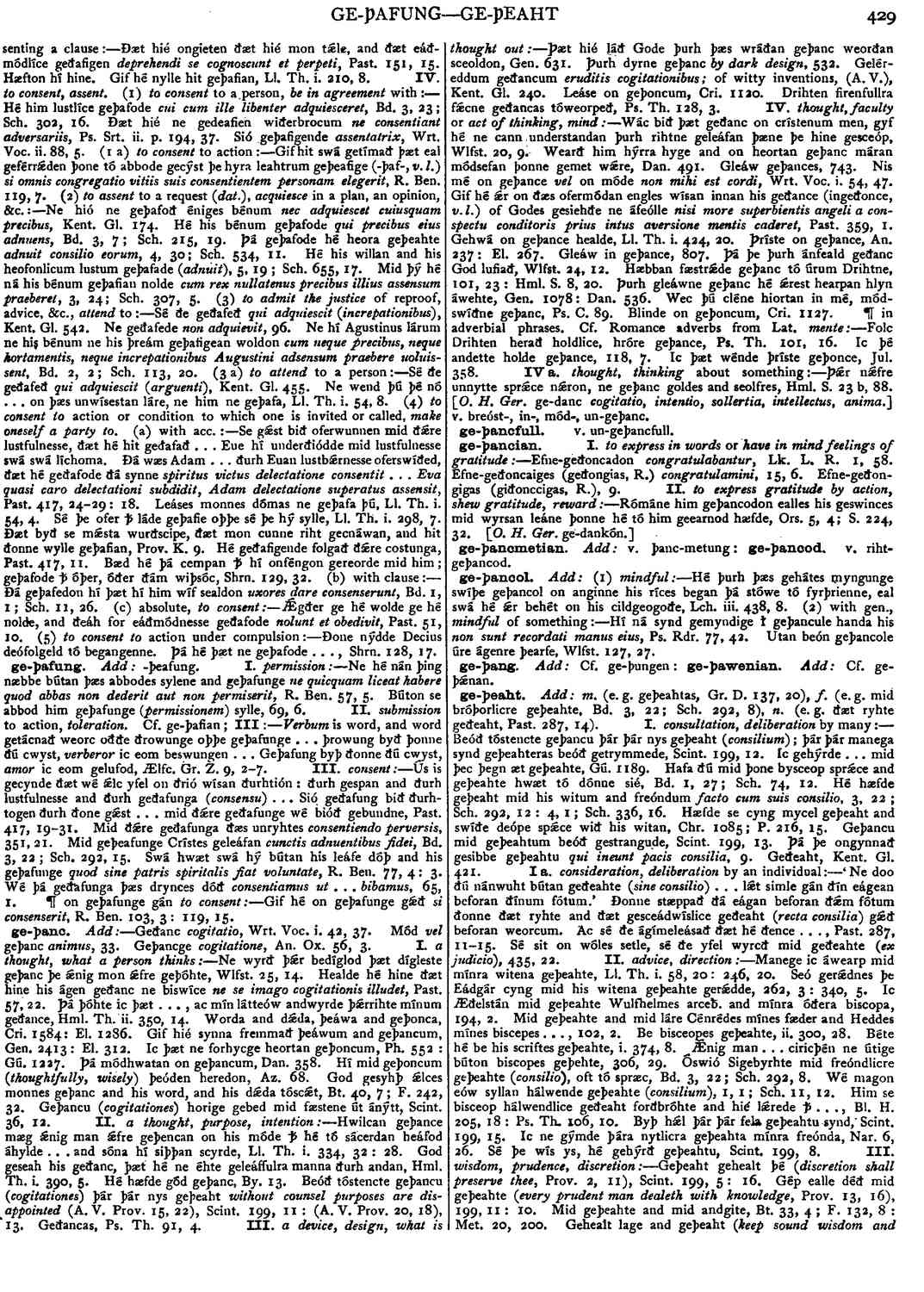ge-þanc
-
Geðanc
cogitatio,
- Wrt. Voc. i. 42, 37.
-
Mód vel geþanc
animus,
33. -
Geþancge
cogitatione,
- An. Ox. 56, 3.
-
Ne wyrð þǽr bedíglod þæt dígleste geþanc þe sénig mon ǽfre geþóhte,
- Wlfst. 25, 14.
-
Healde hé hine ðæt hine his ágen geðanc ne biswíce
ne se imago cogitationis illudet,
- Past. 57, 22.
-
Þá þóhte ic þæt . . . , ac mín látteów andwyrde þǽrrihte mínum geðance,
- Hml. Th. ii. 350, 14.
-
Worda and dǽda, þeáwa and geþonca,
- Cri. 1584: El. 1286.
- Gif hié synna fremmað þeáwum and geþancum. Gen. 2413 : El. 312.
-
Ic þæt ne forhycge heortan geþoncum,
- Ph. 552 : Gú. 1227.
- þá módhwatan on geþancum,
- Dan. 358.
-
Hí mid geþoncum
(thoughtfully, wisely)
þeóden heredon,- Az. 68.
-
God gesyhþ ǽlces monnes geþanc and his word, and his dǽda tóscǽt,
- Bt. 40, 7; F. 242, 32.
-
Geþancu
(cogitationes)
horige gebed mid fæstene út ánýtt,- Scint. 36, 12.
-
Hwilcan geþance mæg ǽnig man ǽfre geþencan on his móde ꝥ hé tó sácerdan heáfod áhylde . . . and sóna hí siþþan scyrde,
- Ll. Th. i. 334, 32 : 28.
-
God geseah his geðanc, þæt hé ne éhte geleáffulra manna ðurh andan,
- Hml. Th. i. 390, 5.
-
Hé hæfde gód geþanc,
- By. 13.
-
Beóð tóstencte geþancu (cogitationes) þár þár nys geþeaht
without counsel purposes are disappointed
(A.- V.) Prov. 15,22), Scint. 199, 11: (A. V. Prov. 20, 18.), 13.
-
Geðancas,
- Ps. Th. 91, 4.
-
þ æ hié láð þurh þæs wráðan geþanc weorðan sceoldon, Gen. 631. þurh dyrne geþanc
by dark design
, 532. -
Gelér*-*eddum geðancum
eruditis cogitationibus
; of witty inventions, (A.- V.) Kent. Gl. 240.
-
Leáse on geþoncum,
- Cri. 1120.
-
Drihten firenfullra fǽcne geðancas tóweorpeð,
- Ps. Th. 128, 3.
- Wác bið þ æt geðanc on crístenum men, gyf hé ne cann understandan þurh rihtne geleáfan þæne þe hine gesceóp. Wlfst. 20, 9.
-
Wearð him hýrra hyge and on heortan geþanc máran módsefan þonne gemet wǽre,
- Dan. 491.
- Gleáw geþances, 743.
-
Nis mé on geþance vel on móde
non mihi est cordi,
- Wrt. Voc. i. 54, 47.
-
Gif hé ǽr on ðaes ofermódan engles wísan innan his geðance (ingeðonce, v. l.) of Godes gesiehðe ne áfeólle
nisi more suferbientis angeli a con*-*spectu conditoris príus intus aversione mentis caderet,
- Past. 359, 1.
-
Gehwá on geþance healde,
- Ll. Th. i. 424, 20. þríste on geþance, An. 237: El. 267.
- Gleáw in geþance, 807.
-
Þá þe þurh ánfeald geðanc God lufiað,
- Wlfst. 24, 12.
-
Hæbban fæstrǽde geþanc tó úrum Drihtne,
- 101, 23 : Hml. S. 8, 20.
-
Wec þú cléne hiortan in mé, mód-swíðne geþanc,
- Ps. C. 89.
-
Blinde on geþoncum,
- Cri. 1127.
-
In adverbial phrases. Cf. Romance adverbs from Lat.
mente
:-- Folc Drihten herað holdlice, hróre geþance,- Ps. Th. 101, 16.
-
Ic þé andette holde geþance,
- 118, 7.
-
Ic þæt wénde þríste geþonce, Jul. 358. IV a.
thought, thinking
about something :-- þǽr nǽfre unnytte sprǽce nǽron, ne geþanc goldes and seolfres,- Hml. S. 23 b, 88.
Bosworth, Joseph. “ge-þanc.” In An Anglo-Saxon Dictionary Online, edited by Thomas Northcote Toller, Christ Sean, and Ondřej Tichy. Prague: Faculty of Arts, Charles University, 2014. https://bosworthtoller.com/50056.
Checked: 0